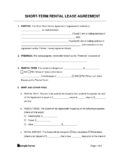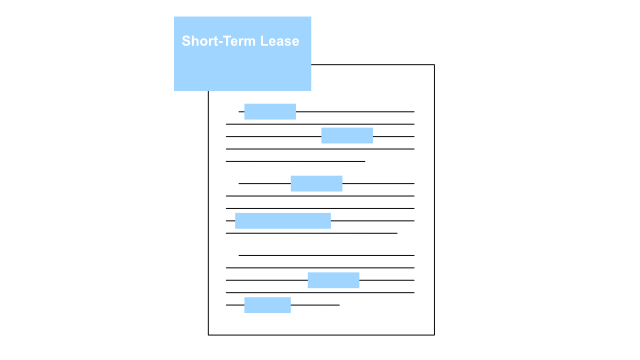A short-term lease agreement is a legally binding contract between a landlord and a tenant for a rental period of fewer than 30 days. This type of temporary lease is commonly used for vacation rentals, business trips, or transitional housing. It outlines the terms, rental amount, occupancy limits, and other important conditions to protect both parties during the stay.
U.S. Housing Statistics (Updated)
- Population (2023): 334,914,895
- Median Households (2022): 125,736,353
- Median Household Income: $75,149
- Owner-Occupied Households: 64.8%
Source: U.S. Census Bureau
How to Write a Short-Term Rental Agreement
Step 1 – Landlord & Tenant Info
List both parties’ full legal names, along with the lease start and end dates.
Step 2 – Occupancy Limits
Limit the number of guests to prevent parties or unauthorized gatherings. (Airbnb banned parties in 2022)
Step 3 – Rental Payment Terms
Clearly state the rent amount, due date, and payment methods (credit card, Zelle, cash, etc.).
Step 4 – Cancellation & Refund Policy
Define when a refund is issued and under what cancellation conditions.
Step 5 – House Rules
- No large gatherings (over 10 people)
- No smoking on premises
- No pets without written consent
- Quiet hours from 10 PM to 7 AM
- Respect check-in and check-out times
- Damages deducted from deposit
- No illegal activity on property
Step 6 – Indemnification Clause
Tenant holds landlord harmless from liability or damages. Landlords are advised to carry rental property insurance (e.g. Farmers Insurance).
Step 7 – Trash & Clean-Up
Tenants must dispose of all trash and return the property in good condition.
Step 8 – Landlord Entry
Most states require a 24-hour notice before entering, unless in an emergency.
Step 9 – Utilities
Landlords may include utilities in rent, but reserve the right to charge for excessive use.
Step 10 – Emergency Contacts
Provide landlord or property manager contact information for issues during the stay.
Step 11 – Dispute Resolution
Use arbitration or mediation to resolve any conflicts between the landlord and tenant.
Federal Rental Laws That Apply to Short-Term Leases
- Fair Housing Act (FHA) – No discrimination based on race, religion, disability. hud.gov
- Americans with Disabilities Act (ADA) – Requires accessibility and accommodations. ada.gov
- Lead-Based Paint Disclosure – Required for properties built before 1978. epa.gov
- Fair Credit Reporting Act (FCRA) – Consent required to check credit. ftc.gov
- Privacy Protections – Rental agreements must protect tenant data. occ.treas.gov
- Uniform Residential Landlord and Tenant Act (URLTA) – Provides basic tenant rights and lease rules. nchh.org
- Anti-Retaliation Laws – Protects tenants who exercise their legal rights. nhlp.org
Find Short-Term Rentals: Homes & Apartments
Vacation Rentals & Beach Homes in California
Due to recent wildfires, some vacation listings may be affected. Stay updated with resources from Cal Fire and Frontline Wildfire Defense.

